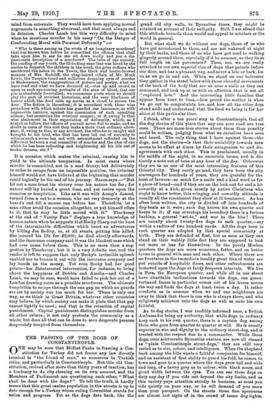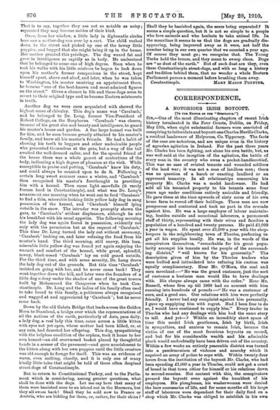THE PASSING OF THE DOGS OF CONSTANTINOPLE.
ONE may be sure that Midhat Pasha in framing a Con- stitution for Turkey did not frame any law directly inimical to " the friend of man," so numerous in Turkish cities, and particularly in Constantinople. But this old Con- stitution, revived after more than thirty years of inaction, has a tendency to do city cleaning on its own account, and the Members of Parliament are questioning each other, " What shall be done with the dogs " To tell the truth, it hardly seems that this great canine population in the streets is up to date enough for a Turkey whose ruling Committee stands for union and progress. Yet as the dogs date back, like the grand old city walls, to Byzantine times, they might be retained on account of their antiquity. Still, I am afraid that this attitude towards them would not appeal to scholars or the world in general.
But what shall we do without our dogs, those of us who have got accustomed to them, and are not wakened at night
by their barks, and those of us who have got used to walking gingerly around them, especially if it be summer, as they lie at full length on the pavements ? Then, too, we are really attached to our own especial clan of dogs that patrols before our door, and has a pleasant wag, and never a bite or bark, for us as we go in and out. When we stand on our balconies they gather in the street below with those cheerful movements of the back of the body that are as near a smile as they can command, and look up at us with an affection that is not all " cupboard love." And the interesting little families that appear from time to time,—how proud the mother is when we go out to congratulate her, and how all the other dogs stand aside and understand that the food we bring is for her alone at this particular time.
I think, after a ten years' stay in Constantinople, that all the dog stories of this place that any one ever read are true ones. There are more true stories about them than possibly could be written, judging from what we ourselves have seen and heard. The only thing that I have against them—the dogs, not the stories—is that their amiability towards man seems to be offset at times by their antagonism to and dis- agreements with each other. This is proclaimed, usually in the middle of the night, in no uncertain terms, and is dis- tinctly a note out of tune at any hour of the day. Otherwise they are to us one of the most interesting features of this Oriental city. They rarely go mad, they have been the city scavengers for hundreds of years, they are grateful for the least of favours—as much for a smile and a kind word as for a piece of bread—and if they are on the look-out for and a bit cowardly at a kick, given mostly by native Christians who ought to know better, this cringing and cowardly attitude is usually all the resentment they show at ill-treatment. As has often been written, the city is divided off into hundreds of dog-beats as it were ; each dog knows his own quarter and keeps to it; if one oversteps his boundary there is a furious barking, a general "set-to," and war to the bite ! There are usually about twenty-five dogs to each quarter,—say within a radius of two hundred yards. All the dogs born in each quarter are adopted by that special community at birth. They are defended at first, but as soon as they can stand on their wabbly little feet they are supposed to look out more or less for themselves. In the purely Moslem quarters the dogs are more numerous, fatter, and on better terms in general with man and each other. Where there are no fountains in the immediate locality great tins of water are put outside of hospitable doors, and other refreshments are bestowed upon the dogs at fairly frequent intervals. We live in Pere, the European quarter, and while all in our street have charitable inclinations towards the dogs, one green- turbaned Imam in particular comes out of his house across the way and feeds the dogs at least twice a day. It rather comforts us in summer when we and our neighbours are away to think that there is one who is always there, and who religiously ministers unto the dogs as well as unto his own faithful
As to dog stories, I was credibly informed once, a British Ambassador being my authority, that while dogs in ordinary keep each to his own quarter, there is a captain dog among them who goes from quarter to quarter at will. lie is usually superior in size and dignity to the ordinary street-dog, and is treated with the respect due to a commander. While these dogs, once aristocratic Byzantine canines, are now all classed as "plain Constantinople street-dogs," they are still very varied as to size, colour, and intelligence. When the shepherd back among the hills wants a faithful companion for himself, and an assistant of first ability to guard his fold, he comes to town and goes to a quarter where the dogs grow tall and wide and long, of a tawny grey as to colour, with black noses, and great width between the eyes. You can see these dogs on duty any day if you ride out beyond the city limits, and as this variety pays attention strictly to business, so must you ride quietly on your way, or he will demand of you more than your passport. On the streets these fine specimens are almost lost sight of in the crowd of lesser dog lights. That is to say, together they are not so notable as noisy ; separated they may become nobles of their kind.
Once, from her window, a little lady in diplomatic circles here saw a mother-dog run over by a cart. The child rushed down to the street and picked up one of the tawny little puppies, and begged that she might bring it up in the house. Her mother granted this privilege. The dog waxed fat and grew in intelligence as rapidly as in body. He understood that he belonged to some one of high degree. Soon when he took his walks with his little mistress he began to look down upon his mother's former companions in the street, kept himself apart, above and aloof, and later, when he was taken to Washington, his master receiving an appointment there, be became " one of the best-known and most-admired figures on the street." Given a chance in life and these dogs seem to revert to their original type and to become Eastern aristocrats in truth.
Another dog we were once acquainted with showed the highest sense of chivalry. This dog's name was ' Carabash,' and he belonged to Dr. Long, former Vice-President of Robert College, on the Bosphorus. Car abash ' was chosen, because of his great size and beauty and intelligence, to guard his master's house and garden. A fine large kennel was built for him, and he soon became greatly attached to his master's family, and knew all his master's friends. He had a habit of showing his teeth to beggars and other undesirable people who presented themselves at the gate, but a wag of the tail awaited the well-dressed caller, and for the special friend of the house there was a whole gamut of contortions of the body, indicating a high degree of pleasure at the visit. While susceptible to praise and petting, Carabash' knew his duty, and could always be counted upon to do it. Following a certain long sweet summer came a winter, and `Caraba.sh' then recognised his master's forethought in providing him with a kenneL Then came light snowfalls (it rarely freezes hard in Constantinople). and what was Dr. Long's amazement one morning when he went out to feed 'Cara.bash.' to find a thin, miserable-looking little yellow Lady dog in snug possession of the kennel, and ' Carabash' himself lying outside in the snow. The intruder was promptly shown the gate, to Carabash's' evident displeasure, although he ate his breakfast with his usual appetite. The following morning the lady dog was again found in possession, evidently not only with the permission but at the request of ' Carabash.' This time Dr. Long turned the lady out without ceremony, Carabash ' looking on, and later refusing the food from his master's hand. The third morning, still snowy, this lean, miserable little yellow dog was found yet again enjoying the warmth and comfort of the kennel, while great, splendid, tawny, black-nosed Carabash' lay on cold guard outside. For the third time, and with some severity, Dr. Long drove the lady dog out of the grounds. But this time ' Carabash' insisted on going with her, and he never came back! They went together down the hill, and later were the founders of a little dog colony under the shadow of one of the great towers built by Mohammed the Conqueror when he took Con- stantinople. Dr. Long and the ladies of his family often used to take bread to this family, a politeness always recognised and wagged at and appreciated by Carabash '; but he never came back.
Down by the old Galata Bridge that leads across the Golden Horn to Stamboul, a bridge over which the representatives of all the nations of the earth, particularly of Asia, pass daily, a lady dog, a real lady this time, came across a little kitten with eyes not yet open, whose mother had been killed, or, at any rate, had deserted her offspring. This dog, sympathising with the helpless condition of the orphan, took it home to her own kennel—an old overturned basket placed by thoughtful hands in a corner of the pavement—and gave nourishment to the kitten along with her own puppies until the little creature was old enough to forage for itself. This was an evidence of warm, even melting, charity, and it is only one of many kindly little tales that might be told of these often despised street-dogs of Constantinople.
But to return to Constitutional Turkey, and to the Parlia- ment which is considering, among greater questions, what shall be done with the dogs. Let me say here that many of them were banished once to an island out in the Marmora, but they all swam back ! Shall they be sold now to France or Austria, who are bidding for them, or, rather, for their skins ? Shall they be banished again, the sexes being separated P It seems a simple question, but it is not so simple to a people who love animals and who hesitate to take animal life. In the meantime it seems to us that the dogs are gradually dis- appearing, being improved away as it were, not half the number being in our own quarter that we counted a year ago. Of course they must go; we recognise that. The Young Turks hold the broom, and they mean to sweep clean. Dogs are " as dust of the earth." But of such dust are they, even these Constantinople street-dogs, and with so long a history and tradition behind them, that no wonder a whole Eastern Parliament pauses a moment before brushing them away.















































 Previous page
Previous page